All products featured are independently chosen by us. However, SoundGuys may receive a commission on orders placed through its retail links. See our ethics statement.
Best earplugs for sleeping
August 28, 2024





Noise can significantly disrupt sleep quality, leading to fatigue, decreased cognitive function, and long-term health issues. Whether you’re dealing with a snoring partner, noisy neighbors, or urban din, earplugs can be a simple yet effective solution for creating a quieter sleep environment.
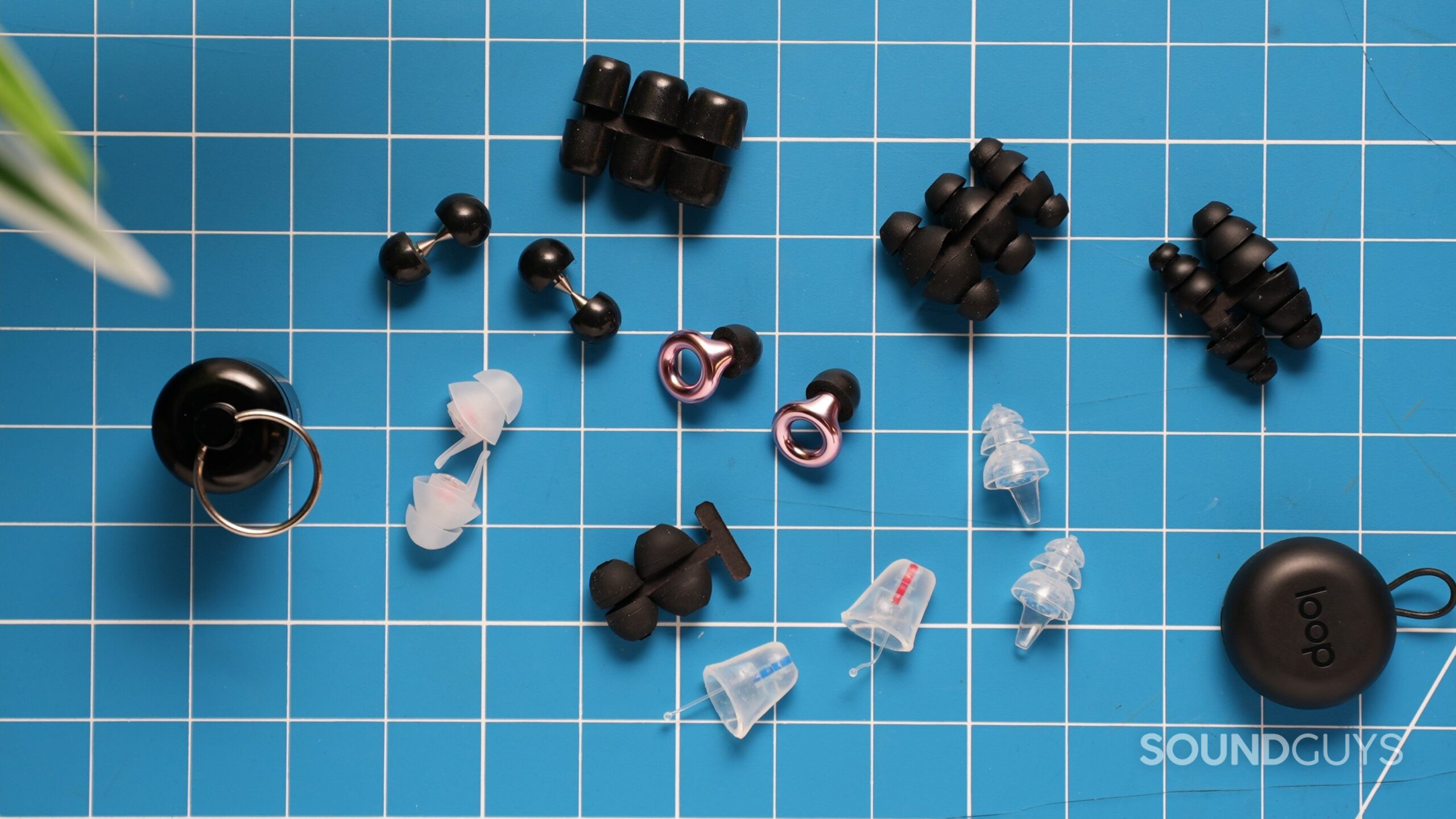
At SoundGuys, we’ve extensively tested and analyzed countless audio products, including earplugs. Our team of audio engineers has rigorously tested these earplugs, measuring their noise-reduction capabilities, comfort levels, and overall effectiveness. This list represents the culmination of our research and hands-on experience, ensuring you get recommendations you can trust for a better night’s sleep.
Editor’s note: this list was published on TKTK, 20XX, and is the first version of the article. Updates will follow as the market changes.
Best earplugs for noise reduction: Loop Quiet
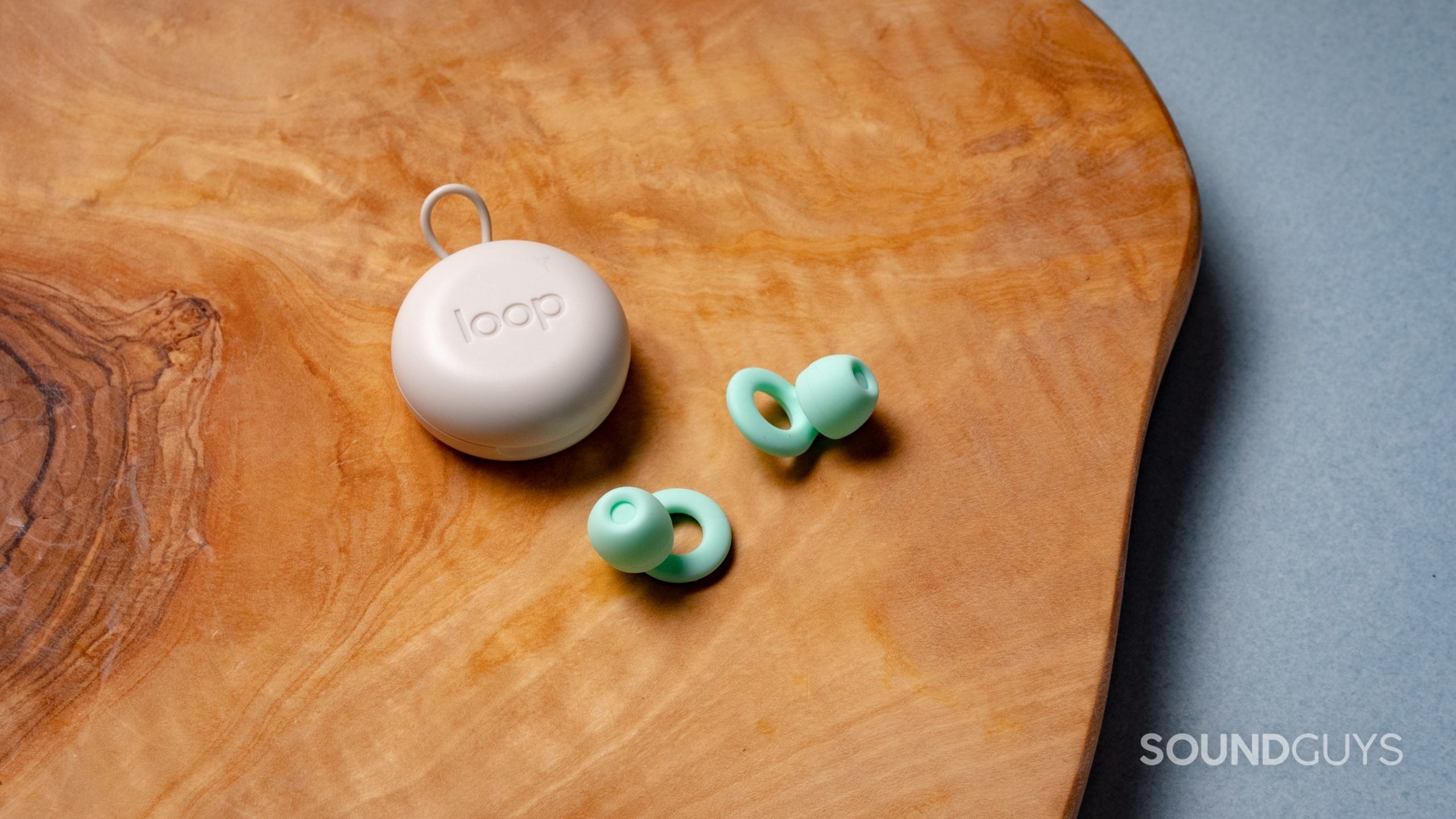
The Loop Quiet earplugs are designed for a variety of uses, from travel to sleep, offering a combination of comfort and impressive noise reduction capabilities. Their effectiveness has even earned them recognition in our list of the best earplugs for concerts as our top pick for loud events.
Reasons to Buy:
- Designed for sleep comfort
- Acoustic channel design enhances effectiveness in sensitive hearing range (2-3kHz)
- Provides some low-frequency attenuation (up to 15dB below 1kHz)
- Comes with four tip sizes
- Easy to adjust once in the ear
- Affordable compared to other high-performance sleep earplugs
Reasons Not to Buy:
- Changing tip sizes can be finicky
- May require an adjustment period for side sleepers
Here’s how they work. The Loop Quiet incorporates an innovative acoustic channel within its loop design, creating a resonator that effectively reduces noise in the frequency range where our hearing is most sensitive. This makes them particularly effective at blocking out disruptive noises that might interrupt sleep, such as traffic, noisy neighbors, or a snoring partner.
These earplugs stand out for their adjustability and comfort, crucial factors for sleep use. The included four tip sizes allow users to find their perfect fit, though changing tips can be a bit challenging. The signature loop design isn’t just for aesthetics—it allows for easy adjustment once the earplugs are inserted, a feature particularly useful when settling in for sleep.
For side sleepers, there may be an adjustment period, but many users report success with extended use. The Loop Quiet’s effectiveness in reducing noise while maintaining comfort makes it an excellent choice for those seeking a peaceful sleep.

- Reusable: Yes
- Noise Reduction Rating (NRR): 14 dB
- Sound reduction: Up to 27 dB
- Material: Silicone
Best earplugs for small ears: Happy Ears
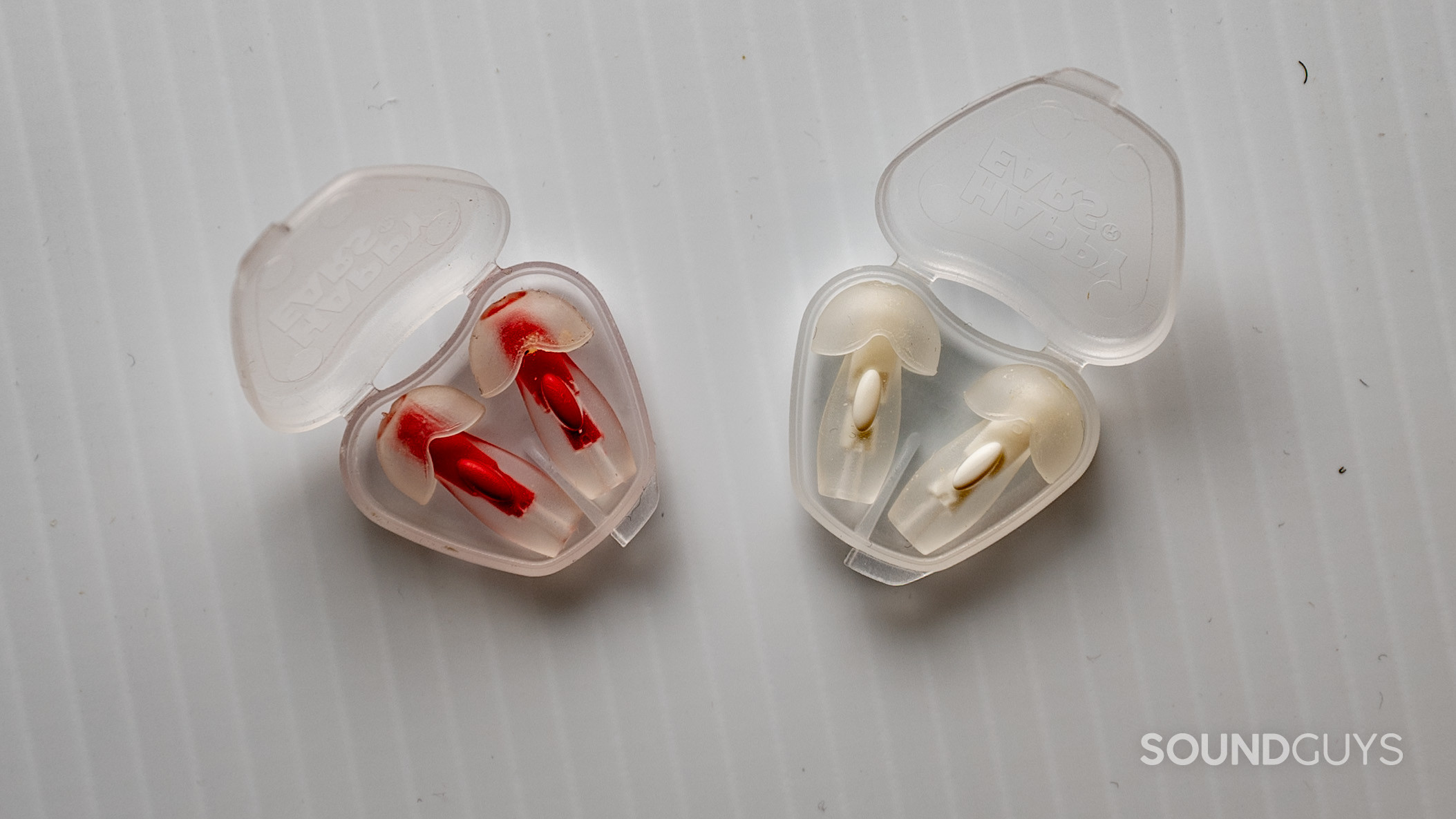
Happy Ears earplugs stand out for their compact design, making them an excellent choice for those with smaller ear canals. Their minimal profile and effective noise reduction capabilities make them suitable for sleep, while their eco-friendly approach will give environmentally conscious users peace of mind. They offer versions made from ocean plastics and recycled materials, with the former providing an additional 2dB of sound reduction.
Reasons to Buy:
- Compact design ideal for small ears
- Effective noise reduction across frequencies
- Easy to achieve a good seal
- Comfortable for most side sleepers
- Recyclable, biodegradable, and compostable packaging
Reasons Not to Buy:
- Higher price point/shipping compared to some competitors
- Limited design options
Happy Ears earplugs offer impressive noise reduction capabilities, with over 15dB attenuation in low frequencies, gradually increasing to over 40dB around 8kHz. They feature a “hump” in attenuation between 2kHz and 3kHz, corresponding to the ear’s most sensitive region, which helps reduce potentially painful loud sounds during sleep.
The compact and straightforward design of these earplugs makes them barely noticeable when worn, a significant advantage for those who find larger earplugs uncomfortable during sleep. Their small size also makes them particularly suitable for users with smaller ear canals who struggle to find a comfortable fit with other brands. They even offer a Discovery Pack with small, medium, and large sizes to help ensure you find the right size earplugs for your ears.

- Reusable: Yes
- Sound reduction: Up to 25 decibels (original version)
- Material: Various options, including recycled plastics
- Sizes: Available in small, medium, and large
Best earplugs for side sleepers: Eargasm Squishies
The Squishies from Eargasm offer a moldable silicone solution that’s particularly well-suited for side sleepers and those who need a customizable fit.
Reasons to Buy:
- Highly moldable for a custom fit
- Comfortable for side sleeping
- Can be broken into smaller pieces for smaller ear canals
- Effective for both noise reduction and water protection
- Comes with a free storage case
- Includes eight reusable pairs
Reasons Not to Buy:
- Slightly more expensive than some similar moldable silicone options
- The lifespan of each pair may vary
These earplugs are about 50% larger than many competing brands, providing more material to mold or work with. For instance, if you have smaller ear canals, you can easily cut them or break them apart into smaller pieces—a flexibility not offered by all moldable earplugs.
With an NRR of 22 dB, these earplugs offer solid noise reduction capabilities, suitable for blocking out common sleep disturbances. They’re also waterproof and create a tight seal, making them multi-functional for swimming or other water activities.
The package includes eight pairs of earplugs and a sealed carrying case, adding value and convenience. While they’re reusable, we haven’t tested the exact number of uses per pair, which could be a consideration for long-term use.
- Reusable: Yes
- Noise Reduction Rating (NRR): 22 dB
- Material: Moldable silicone
- Waterproof: Yes
Best earplugs for comfort: Curvd Everyday
Curvd Everyday Earplugs are a versatile, comfortable, and environmentally friendly option for noise reduction, including sleep. Their flexibility and fit also make them comfortable for catching some shut-eye on a long flight or road trip.
Reasons to Buy:
- Ergonomic design
- Made from eco-friendly, recyclable materials
- Versatile use for sleep, work, travel, and more
- Includes multiple sets of ear tips
- Comes with a compact aluminum carrying case
Reasons Not to Buy:
- Might not fit very small ears
These earplugs feature an ergonomic design that complements the natural curves of the ear, providing a secure and comfortable fit for extended wear. They received an SNR (Single Number Rating) of 30 decibels and an NRR (Noise Reduction Rating) of 15 dB, which is stated to be EPA-certified. This level of noise reduction is suitable for various situations, from sleep to concerts to noisy work environments.
A notable feature of these earplugs is their eco-friendly approach. The manufacturer states they are made from recyclable materials, contain no plastic, and are free from harmful chemicals. The packaging is also described as FSC-certified and sustainable.
The package includes one set of reusable earplugs, four sets of ultra-soft ear canal tips, and a sturdy aluminum carrying case. The earplugs are also easy to clean, adding to their reusability.
- Reusable: Yes
- Noise Reduction Rating (NRR): 15 dB (EPA certified)
- Sound Reduction: Up to 30 dB (SNR)
- Material: 100% recyclable materials
Best budget earplugs for sleeping: Mack’s Pillow Soft

Mack’s Pillow Soft Silicone Putty Earplugs offer an affordable and effective solution for noise reduction during sleep, particularly for side sleepers. These moldable earplugs provide a customizable fit that should conform to the contours of each user’s ears.
Reasons to Buy:
- Very affordable
- Moldable for a custom fit
- Comfortable for side sleeping
- Effective noise reduction
- Waterproof
Reasons Not to Buy:
- Limited reusability (up to 5 uses per pair)
- Earplugs cover the ear canal instead of fitting inside
- Non-recyclable and not environmentally friendly
At around $10 for a pack of 24 pairs, they offer good value, especially considering each pair can be used up to 5 times.
It’s worth noting that these earplugs cover the ear canal rather than fitting inside it. While this contributes to their comfort for side sleeping, it also means users need to be careful to apply them correctly to avoid lodging them in the ear canal.
The earplugs are also versatile and suitable for various uses beyond sleeping, such as swimming, studying, or attending loud events. They’re waterproof and can help prevent water from entering the ears during swimming or water-based activities.
- Reusable: Yes, up to 5 uses per pair
- Noise Reduction Rating (NRR): 22 dB (US Standard)
- Single Number Rating (SNR): 30 dB (EU Standard)
- Material: Moldable silicone putty
Who should buy the Anker Soundcore Sleep A20?
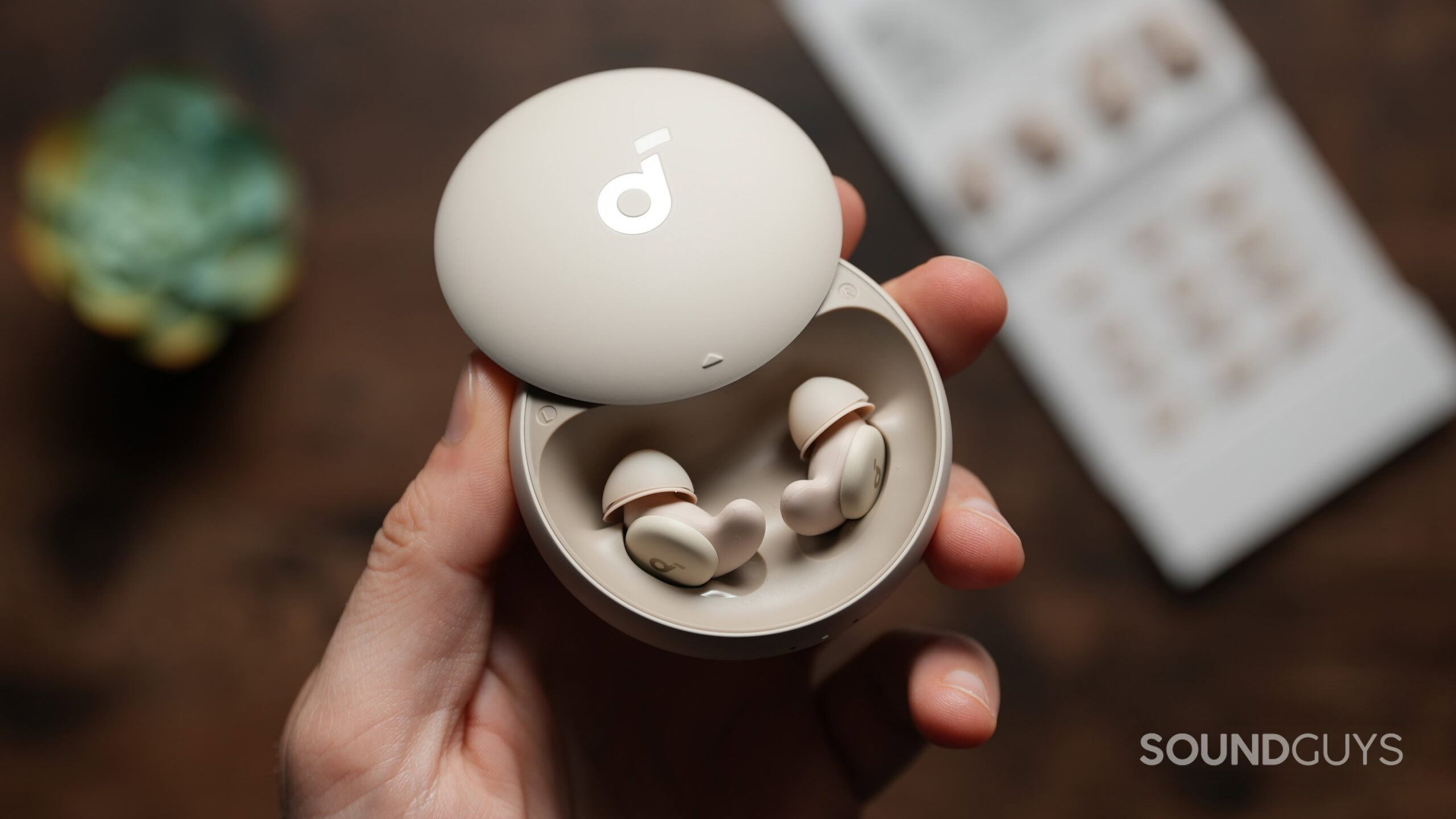
The Anker Soundcore Sleep A20 earbuds offer a tech-savvy alternative to traditional earplugs for sleep. Priced at $149.99, these Bluetooth earbuds are designed specifically for nighttime use, focusing on comfort and sleep-enhancing features.
With a flat design that doesn’t protrude, the Sleep A20 earbuds are suitable for all sleeping positions, including side sleeping. They come with multiple ear tips and wing sizes to ensure a secure fit. The earbuds provide moderate passive noise isolation, particularly effective against high-frequency sounds, though they struggle more with low-frequency noise.
Battery life is impressive, offering up to 14 hours of playtime on a single charge. The accompanying app provides sleep-tracking features and a library of environmental sounds to help you doze off. Still, while the earbuds can play music or podcasts, the sound quality is mediocre for general listening.
For those who find audio helpful for sleep and are interested in tracking their sleep patterns, the Anker Soundcore Sleep A20 could be a worthwhile investment. However, they may not provide the same level of noise isolation as high-quality earplugs, especially for low-frequency sounds.

What you should know about earplugs for sleeping
When choosing earplugs for sleeping, consider these key factors:
- Noise Reduction Rating (NRR): Ranges from 0 to 33 decibels; higher means better noise reduction.
- Material: Options include foam, silicone, wax, and cotton, each with different benefits. If you have skin sensitivities, be sure to check the material and try out different kinds to see what you like best.
- Fit and Comfort: Depending on the size of your ear canal, different sizes of earplugs can provide a better fit. Moldable earplugs are more versatile and can fit the shape of your ear. Ideally, you want something that stays secure and won’t fall out during the night.
- Reusability: Single-use for occasional use, reusable for regular use, and environmental considerations.
- Sleeping Position: Side sleepers may need softer or low-profile options.
- Hygiene: Proper cleaning and replacement are crucial to prevent ear infections.
- Breathability: Some earplugs offer ventilation to prevent pressure buildup.
How we test earplugs for sleeping
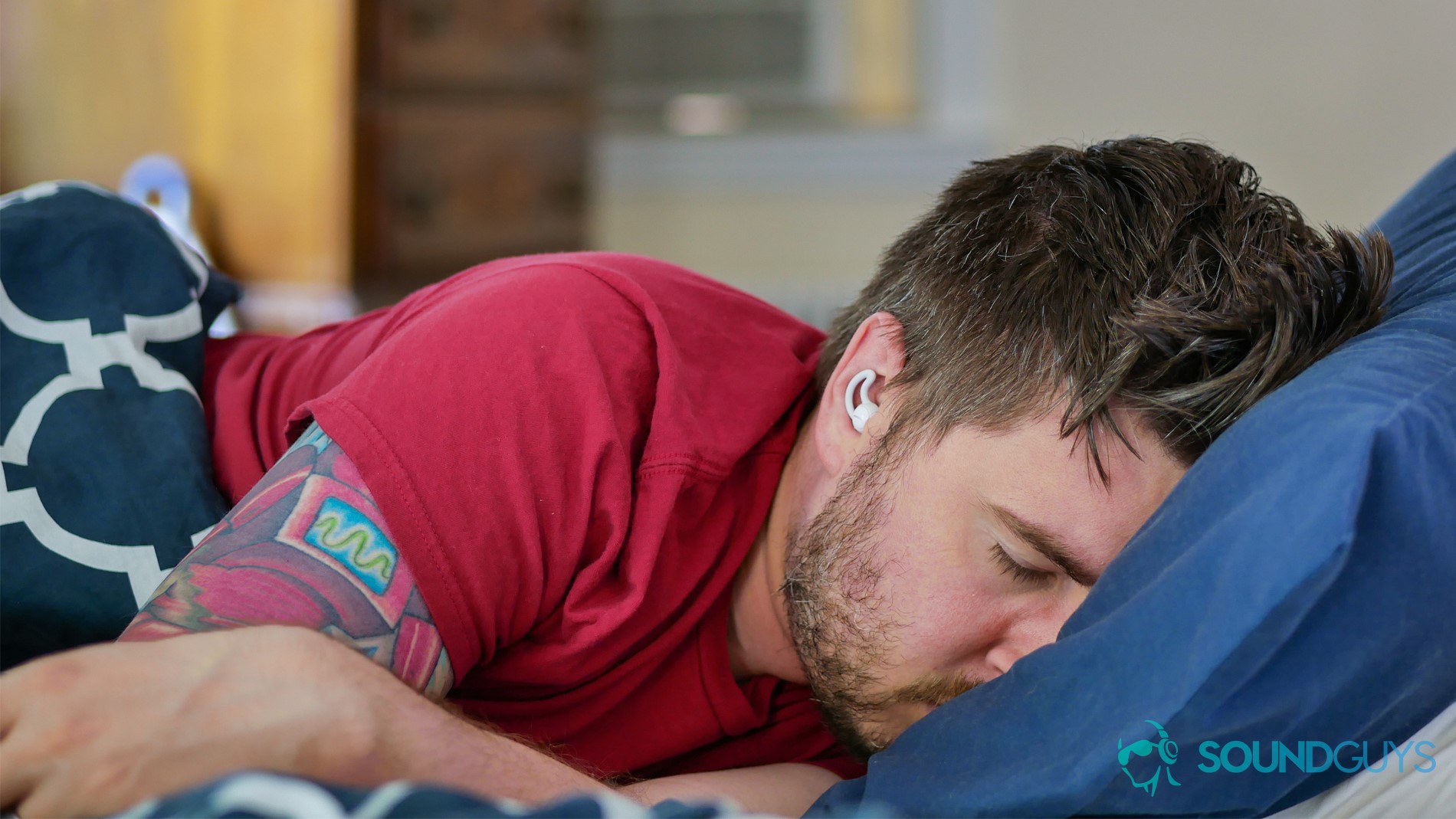
At SoundGuys, we rigorously test earplugs in the real world. Each pair is used over multiple nights in various sleeping positions to assess comfort and effectiveness. We measure noise reduction capabilities across different frequency ranges using calibrated equipment. For reusable earplugs, we evaluate durability and performance over extended use. We pay special attention to side sleeper compatibility and how the earplugs perform in different conditions. Our testing also includes ease of use, considering factors like insertion, removal, and cleaning.
How we choose the best earplugs for sleeping
Our selection process combines comprehensive market research, user feedback analysis, and expert analyses. We compare the performance of different earplugs under identical conditions and conduct long-term testing to assess durability and consistent performance. Value is a key consideration, ensuring our recommendations offer a good price-to-performance ratio. We also factor in environmental impact, especially when comparing disposable and reusable options. This holistic approach allows us to recommend earplugs that truly meet the needs of various sleepers.
Why you should trust SoundGuys
SoundGuys is committed to providing unbiased, in-depth analyses of audio products. Our team consists of audio engineers and experienced product testers. We maintain editorial independence and do not accept payment for positive reviews. Our testing protocols are designed to simulate real-world usage and provide accurate data. We clearly communicate our methodologies and any limitations in our reviews. Our recommendations are based on what genuinely benefits the end-user, not market trends or brand popularity. We regularly update our reviews to ensure they remain relevant and accurate, and we actively engage with our reader community, addressing questions and incorporating feedback into our testing processes.
Frequently asked questions
The best earplugs for sleeping depend on individual needs and preferences. Foam earplugs are popular for their affordability and effectiveness in noise reduction. Silicone earplugs offer better durability and can be more comfortable for side sleepers. Custom-molded earplugs provide the best fit but are more expensive. Consider factors like noise reduction rating, comfort, and sleeping position when choosing.
While it’s generally safe to sleep with earplugs nightly, it’s important to use them correctly to avoid potential issues. Proper hygiene is crucial – clean reusable earplugs regularly and replace disposable ones as recommended. Some users may experience ear wax buildup or minor irritation. If you experience discomfort or ear pain, consult a healthcare professional. It’s also advisable to give your ears occasional breaks from earplugs.
Both silicone and foam earplugs have their advantages for sleeping:
- Foam earplugs typically offer higher noise reduction ratings and are more affordable. They’re ideal for those prioritizing maximum noise blocking.
- Silicone earplugs are often more comfortable for extended wear and side sleeping. They’re also reusable and easier to clean, making them more environmentally friendly.
The choice between silicone and foam ultimately depends on personal comfort, ear canal size, and specific noise-blocking needs. Some users find that alternating between the two types works best for them.
Thank you for being part of our community. Read our Comment Policy before posting.